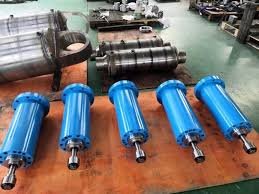Introduction
Industrial operations, as well as construction sites and farming operations, depend on hydraulic cylinders for proper machine function. Strategic maintenance activities, together with appropriate care measures, will lengthen hydraulic cylinders’ usable period, which means better operational performance and decreased equipment stoppages. The following article presents necessary maintenance practices that ensure excellent performance of hydraulic cylinders.
1. Regular Inspection
A conceptual understanding of potential issues at an early phase helps prevent major operational breakdowns with their resulting costly maintenance costs.
What to check:
- Checking for leaks that occur in both seals and hoses and connections forms part of the inspection process.
- Paid attention should be given to piston rod assessment for scratches and corrosion.
- All mounting screws must have a secure attachment to the parts.
2. Keep Hydraulic Fluid Clean
The presence of contaminants within fluid causes premature wear which results in decreased efficiency alongside an increase in both damage risk.
Maintenance tips:
- Use high-quality, manufacturer-recommended hydraulic fluid.
- Regular changing of hydraulic fluid needs to comply with the manufacturer’s specified schedule.
- Scheduled replacement of fitted elements protects the machinery from accumulating debris and dust. For detailed information please visit qy-hydraulic.com.
3. Proper Lubrication
Hydraulic systems depend on lubrication because it prevents friction which causes both wear and overheating of components.
Best practices:
- The hydraulic system requires the correct lubricant type that manufacturers have specified.
- Implementation of proper lubrication requires applying recommended lubricants to moving parts as well as seals when needed.
- Equipment lubrication points should always remain clear from all dirt and external contaminants.
4. Protect the Cylinder from Contaminants
The system operates best when free from dirt and water-based particles because these substances trigger blockages and corrosion as well as inefficient machine operation.
Preventive measures:
- Protective covers or bellows need to be used for exposed cylinder rods.
- Machinery should be kept in clean dry storage locations as a preventive measure for downtimes.
- The removal of external surface dirt and grime needs regular cleaning maintenance.
5. Prevent Overloading and Excessive Pressure
Exceeding the hydraulic system’s capabilities results in mechanical component damage together with equipment failure.
How to avoid:
- Hydraulic system operation must stay under the manufacturer-defined load specifications.
- Regular checks should include hydraulic pressure observations and prevention of abrupt pressure surges.
- Pressure relief valves should be utilized to defend against dangerous amounts of force applied to the system.
6. Proper Storage and Handling
The improper placement of hydraulic systems during storage results in system breakdown and causes damage and breakdown of the components.
Storage tips:
- The proper storage location for hydraulic cylinders should be free from dampness and easily maintained by humans.
- The storage of unused hydraulic cylinders requires filling them with fresh clean oil to stop internal rust formation.
- Heavy loads should be prevented from positioning on stored cylinders.
Conclusion
The life expectancy of hydraulic cylinders gradually increases when operators provide both appropriate maintenance actions and proper care routines. The combination of regular inspections with clean fluid maintenance, appropriate lubrication, and avoidance of overload conditions will grant you reliable operation while lowering repair expenses. The implementation of these recommended practices will optimize the functional efficiency along with the extended operating life of hydraulic systems.
